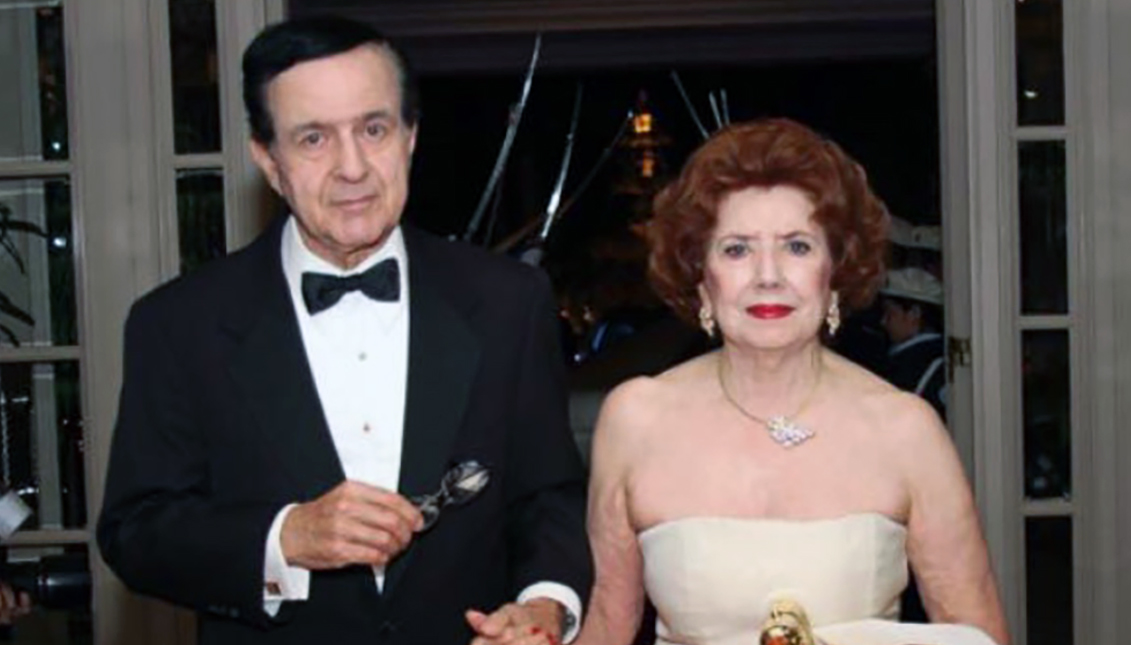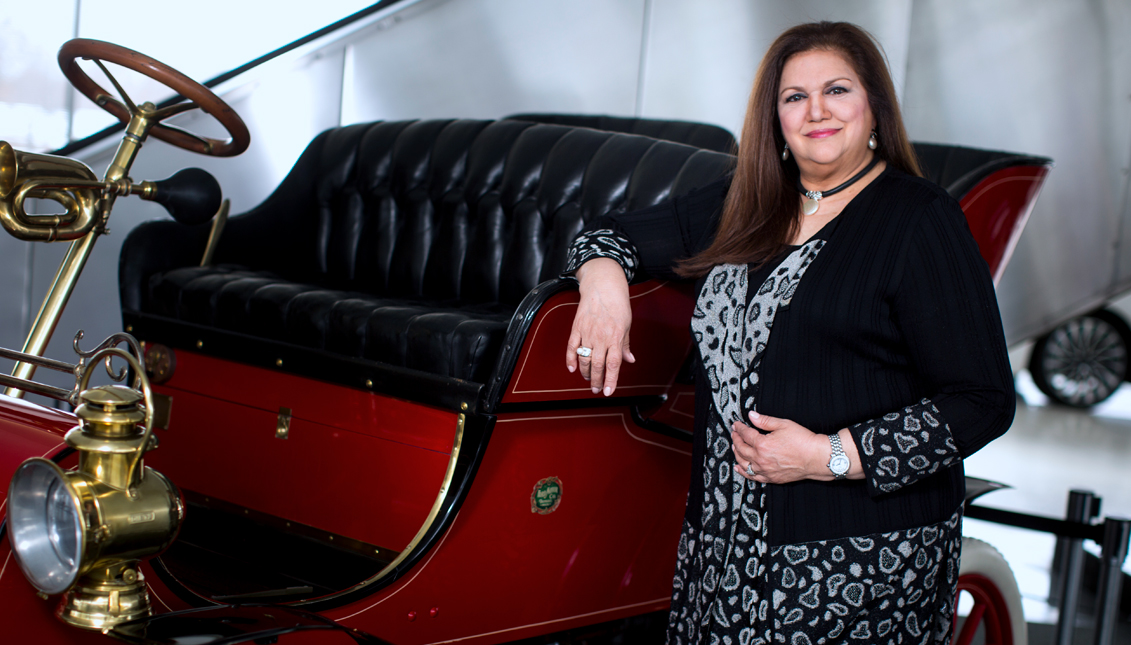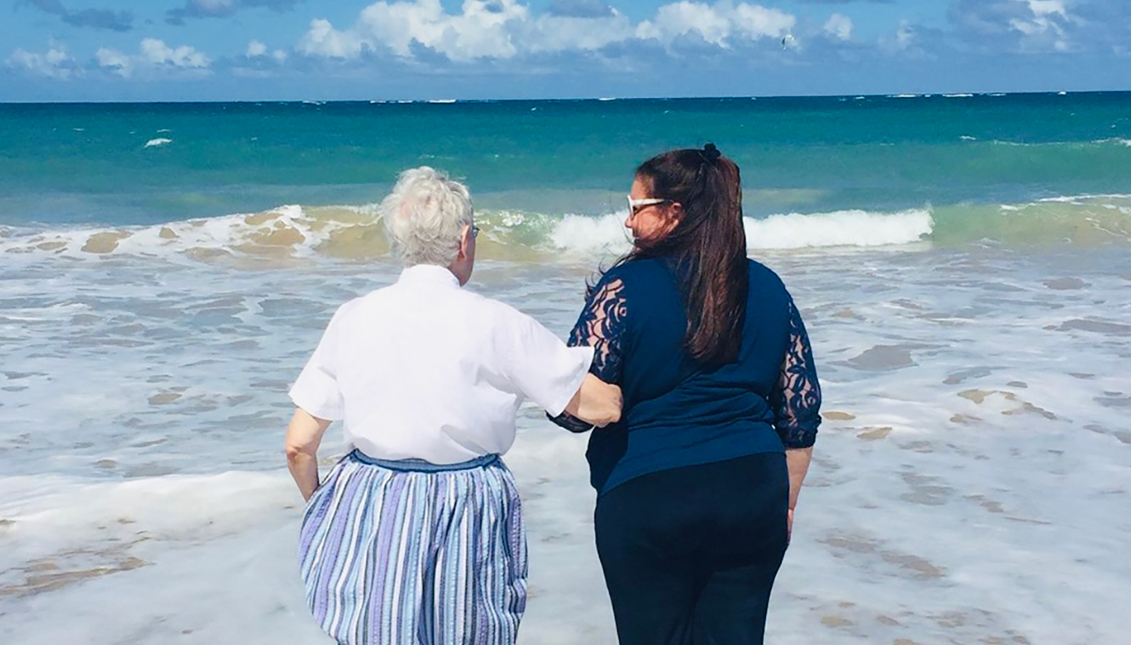
The woman at the pinnacle
Kimberly Casiano’s trajectory is living proof that women can fly high, and inspire along the way.
Kimberly Casiano has a sweet voice that belies the unshakeable determination that brought her success and the opportunity to give back. Speaking on the phone — COVID-19 has put paid to the one-on-one interview — we traded memories of Puerto Rico (where we both grew up) and spoke about the arc of her professional and personal life, her triumphs and failures, and what lies ahead for this hard-working woman.
Casiano, born in New York City, learned the importance of work at an early age. When she was elected to the board of directors of Ford Motor Company in 2003, the first Hispanic woman to serve on the board of any top-five Fortune 100 corporate boards, it was the culmination of years of laboring in the corporate world and just one of her many achievements.
Besides the pinnacles, what is it that makes her a whole person and an example for other Latina women to follow?
For Casiano, 63, it is her devotion as a wife to Peruvian-born Juan F. Woodroffe, and her two children, now grown. She is living proof that with hard graft and a sense of purpose, a woman can have it all, or at least come pretty close.
Her Norte — her star Polaris? Her parents.

“I am the daughter of two very poor Puerto Ricans from the South Bronx,” Casiano said.
From her father, she learned determination, to never forget where you came from and give back; her mother taught her that you can succeed on your own terms, as a professional and as a woman; that you can, as a woman, have it all: education, career, love, family.
Manuel and Nora Casiano, married when both were 20, were two determined individuals who dreamed big, worked hard, and taught their daughter to do the same — and to never let gender stand in her way.
Nora was the only child of two adoring parents, who scrimped and saved so she could go to college and become a teacher. Manuel never graduated from high school — but that didn’t stop him.
At 16, he forged a birth certificate and joined the Marine Corps. He learned a trade — photography — and later got a job as a messenger boy in a film studio in Manhattan. He worked hard — sometimes without pay — to learn special effects and film editing.
“He had known hunger as a child and was sleeping in alleyways with his mother and sister when they were evicted because they could not pay the rent,” she said. “His father had abandoned them when my father was young. So my father never wanted to be poor in his life again.”
“As a child, I would count the knife-wound scars on his body from gang fights while he was growing up,” she said.
“As a child, I would count the knife-wound scars on his body from gang fights while he was growing up,” she said.
His experiences gave him an unshakable determination to work hard and be his boss.
With money from his family – and investment from his bosses who saw how hard he worked – he started his business in the mid-1950s. In the late-1960s, after years of working 80-hour weeks, he took his company public and then sold it.
In 20 years, he went from living in a tenement in the South Bronx to living in a 14-room duplex apartment on Park Avenue and 74th Street.
When Casiano was 12, her father moved the family from New York to Puerto Rico, where he went to work with the then Governor Luis A. Ferre as a member of his cabinet.
There he founded Casiano Communications, where he was chairman of the board and Nora, the family firm’s business manager, and filled a niche for business publications and other magazines that is still a success today.
Her father taught her to fly planes, play a mean game of billiards, and not to choose her future based on gender-roles.
“My father was a private pilot and we had a small plane in New York, which we later flew to Puerto Rico. When I was 9 or 10 years old, my father would let me fly the plane once he had taken off,” she said.
“Some people sit on their father’s lap and drive a car. I flew a plane,” she said. When came time to choose potential colleges, girl’s colleges were not even suggested.
“The mantra of my childhood was: ‘Get the best education that you can; it is the only thing that no one can ever take away from you,’” she said.
And then there was Sister Joan, a teacher we both had at Perpetuo Socorro High School, who taught her English, discipline, and how to nurture a life-long friendship.
“Sister Joan was a force to be reckoned with,” she said. “The precise and succinct English I speak is because of Sister Joan. My English score on the SAT, which helped me get accepted at top colleges, is because of Sister Joan,” she said.
“But Sister Joan’s more profound influence in my life really started several decades after I graduated from high school when Sister Joan and I became friends through extensive correspondence –- old-fashioned snail-mail letters,” she said.
The most crucial part of her professional and personal DNA came from Nora: that of women’s equality.
“My mother instilled in me the most crucial ingredient of my personal and professional DNA – that of women’s equality. She was a beacon for me – and others – to follow,” she said.
And a beacon she was.
It was 1975, and the United Nations proclaimed that 1977 would be the International Year of the Women. In the U.S, President Gerald Ford formed a 35-member commission to organize the conference, the first since the Women’s Rights Convention in Seneca Falls, New York, in 1848.
It brought together some amazing women: Katherine Hepburn, Betty Friedan, Maya Angelou, Gloria Steinem, Anne Armstrong, who was the first female U.S. ambassador to England, and Nora Casiano.
“Whenever I think that my Mom was part of such an important and historic event, I feel so very proud and grateful,” Casiano said. And even though the conference did not bring dramatic change, it planted a seed.
“And all great change starts with a seed,” she said.

In 1979, Casiano graduated magna cum laude from Princeton University, where she studied politics and Latin American studies. In 1981, she earned a Master’s Degree in Business Administration from Harvard University, the youngest woman to receive an MBA from that prestigious institution at the time.
But it wasn’t easy.
Two incidents stood out in our conversation that forged Casiano’s purpose to empower Latina women in the workplace and at home.
Casiano was at Princeton in the 1970s when (now-Supreme Court Justice) Sonia Sotomayor was there and the university had recently gone coed.
“Affirmative action was in full force and a day didn’t pass when someone didn’t say to me how lucky I was that affirmative action existed so I could get into Princeton,” she said. Or other students saying she was lucky to be both a woman and Hispanic because that got her into Princeton!
She came up with the perfect answer. Casiano asked her parents to mail her SAT scores to her at Princeton.
“I would walk around with them in my purse,” she said. “Every time someone said something, I would calmly take out my SAT scores and say: ‘These are my SAT scores. What were yours?’”
“I believe that it is essential that we seek advancement because of merit, because we have worked for it, and not because we think anything is owed to us. I cannot stress this point enough,” she said.
Merit must be the reason – not some tokenism or feel-good program simply because we are Hispanics or women, she said.
An earlier incident also left its mark. When she was younger, she attended one of the most exclusive girl’s Catholic schools in Manhattan. Her classmate was Caroline Kennedy, the daughter of President John F. Kennedy.
“We all knew that every year two scholarships were given out and it was assumed that I was one recipient and the only black girl in our class was the other recipient. Some of the girls could be cruel in subtle ways,” she said.
One day, she arrived home, to her 14 room duplex apartment on 74th Street and Park Avenue, crying. “I asked my mother: “Are we rich?” Her mother answered that we were rich because of our love and close family. Seed, planted.

Casiano began her business career soon after leaving Harvard when she founded Caribbean Marketing Overseas Corporation, a consulting firm specializing in financing, trade, and investment promotion between the United States, the Caribbean, and Central America.
In 1988, she joined Casiano Communications. She held several management positions in the company until 1994 when she became president of the company.
In 2003, she was elected to the board of directors of Ford Motor Company and serves on three committees — Audit; Nominating and Corporate Governance; and Sustainability and Innovation.
RELATED CONTENT
In 2006, she joined the board of directors of Mutual of America, and in 2010, that of Mead Johnson Nutrition Company, the leading manufacturer of infant formula in the world.
Casiano is on the board of directors of the Hispanic Scholarship Fund (HSF), a non-profit which awards almost $50 million annually in scholarships to Hispanic college students, and is a founding board member of the Latino Corporate Directors Association (LCDA).
She is also a member of the board of advisors of Moffitt Cancer Center in Tampa, Florida, the third busiest cancer center in the country.
In Puerto Rico, she co-founded and is vice-chair of Nuestra Casa de los Niños, a nonprofit group providing private school education for economically disadvantaged children.
Casiano leads the fundraising of the American Cancer Society in Puerto Rico, established the Red Gala annual event, and the Jose M. Berrocal Scholarship program for college-bound students who are cancer survivors.
For years she has honored Berrocal’s memory, a former Princeton classmate, who died after having served as the youngest president of the Puerto Rico Government Development Bank.

Besides her parents, I asked, what are your guiding principles? Her children, she said, would point to two — ones she repeats to them constantly: honesty/integrity and humility.
“Honesty/integrity is part of my DNA. Honesty must be 100%. There is no grey area when it comes to honesty/integrity. It is like pregnancy. You either are or you are not,” she said.
However, honesty will not always make you the most popular person. “I am working on being more diplomatic, though, without losing my honesty,” she said.
The second guiding principle is to remember that “you don’t know, what you don’t know,” she said.
The second guiding principle is to remember that “you don’t know, what you don’t know,” she said.
“Not remembering this leads to “know-it-all” people who stop asking questions, learning, relying on advice, and doing contingency planning,” she said.
And what, I asked her, has been the most valuable teachable failure — because these are also important — in her life and work.
“My most valuable experience was prior to my business life,” she said. “At Princeton University, I cultivated very few relationships and, today, I have only two friends from Princeton that I keep in close contact with. That was a mistake.”
“Relationships are the foundation of any fulfilling life. We must give priority to nurturing relationships both personally and in our professional life,” she said.
“I believe that the friendships you make as a student and early in your career — when neither you nor they have achieved notoriety or success — are the most sincere you will ever make. Nurture those friendships,” she said.
Casiano sees the next stage of her life focused on five areas.
“First is to focus on my husband and children. During the building stage, my husband and I were working long hours, often six days a week, and sometimes my children may have gotten short-changed,” she said.
“We tried to make up for it with travels that ALWAYS included our children. When my daughter and son graduated from high school, my husband and I had taken them to travel to over 45 countries. Now, we look forward to sharing more quality time with them and taking them and their significant others traveling,” she said.
Her second focus is to continue to be an excellent board member.
“It is a privilege to serve on a board, but it is also a tremendous commitment characterized by my responsibility to do my homework,” she said.
“I am continuously keeping abreast about the company, the industry, the competition, new technologies, new areas of board governance, risks and risk mitigation, control issues, the global business arena, ESG issues and, with Coronavirus, all the implications for the changing paradigm of doing business,” she said.
The third is on helping Latina women become more self-confident, empowered, knowledgeable, and upwardly mobile. Casiano says it is essential that they be given opportunities to earn positions of power based on merit.
The fourth is that she wants to continue being instrumental in helping more deserving Latinos earn a seat in Corporate America’s boardrooms and C-suites.
And finally, for the past 25 years, her philanthropic priority has been raising money and advocacy for cancer research, prevention, and early detection.
Because for Casiano, in giving back she is honoring her parents, forging a legacy for her children, and planting the seeds for the future of the Latino community.
“My parents both knew extreme poverty as children and understood the importance of ‘giving back.’ From the time I was very young, I saw them giving back to the community, as soon as they had something to give,” she said.
There is still much work to be done and Casiano will be there — sitting on important boards as she paves the way for other Latina women to take her place.










LEAVE A COMMENT: